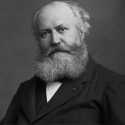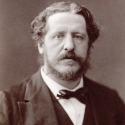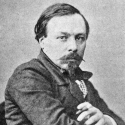Roméo & Juliette

|
Charles GounodComposer |
Charles Gounod (June 17, 1818 - October 18, 1893) was a French composer noted particularly for his operas, of which the most famous is Faust.
Gounod’s father was a painter and his mother was a capable pianist who gave Gounod his early training in music. Gounod was educated at the Lycée Saint-Louis, where he remained until 1835. After taking his degree in philosophy, Gounod began to study music with the Bohemian composer Anton Reicha. On Reicha’s death Gounod entered the Paris Conservatoire, where he studied under Fromental Halévy and Jean-François Lesueur. Three years later Gounod's cantata Fernand won him the Prix de Rome for music, an award that entailed a three-year stay in Rome at the Villa Medici.
In Italy Gounod devoted a considerable amount of his attention to the works of Giovanni da Palestrina, an Italian Renaissance composer. From Rome Gounod proceeded to Vienna, where a mass and requiem, composed in Italy, were performed in 1842 and 1843. Returning to Paris, he passed through Prague, Dresden, and Berlin and met Felix Mendelssohn in Leipzig.
In Paris, Gounod became organist and choirmaster at the Church of the Missions Étrangères, and for two years he mainly studied theology. In 1846 Gounod entered the seminary of Saint-Sulpice but in 1847 decided against taking holy orders. A requiem and a Te Deum that he had started writing the previous year remained unfinished, and he turned to composing for the operatic stage.
The reception of his earliest operas, Sapho (1851) and La Nonne sanglante (1854), was not very enthusiastic despite favorable reviews by the composer Hector Berlioz. In his Messe de Sainte-Cécile (1855) Gounod attempted to blend the sacred with a more secular style of composition. An excursion into comic opera followed with Le Médecin malgré lui (1858), based on Molière’s comedy. From 1852 Gounod worked on Faust, using a libretto by M. Carré and J. Barbier based on J.W. von Goethe’s tragedy. The production of Faust on March 19, 1859, marked a new phase in the development of French opera. This work has continued to overshadow all of Gounod’s subsequent stage works, including Philémon et Baucis (1860), La Colombe (1860), the fairly successful Mireille (1864) based on a Provençal poem by Frédéric Mistral, and Roméo and Juliette (1867).
In 1852 Gounod had become conductor of the Orphéon Choral Society in Paris, for which he wrote a number of choral works, including two masses. From 1870 he spent five years in London, formed a choir to which he gave his name (and which later became the Royal Choral Society), and devoted himself almost entirely to the writing of oratorios. Gallia, a lamentation for solo soprano, chorus, and orchestra, inspired by the French military defeat of 1870, was first performed in 1871 and was followed by the oratorios La Rédemption and Mors et Vita in 1882 and 1885. He was made a grand officier of the Legion of Honour in 1888.
Gounod’s melodic vein is unmistakably original, though often oversentimental. Gounod knew how to write for the voice and was also a skillful orchestrator; but in his operas his sense of musical characterization, though rarely devoid of charm, is often excessively facile, and the religiosity displayed in his sacred music is too often superficial. Gounod's Meditation (Ave Maria) superimposed on Johann Sebastian Bach’s Prelude in C Major (from The Well-Tempered Clavier, Book I) illustrates both his inventiveness and ease as a melodist and his naïveté in matters of style. The operas Faust, Mireille, and Le Médecin malgré lui show his melodic talents at their best.

|
Jules BarbierLibrettist |
Jules Barbier, one of the most important librettists of the 19th century, began his career with the production of his intermède, L'Ombre de Molière, at the Comédie-Française (1847). In the years that followed, Barbier worked with Labiche, Decourcelle and Battu but, between 1849 and 1872, his main collaborator was Michel Carré, with whom he produced plays, comedies, vaudevilles, and opera librettos. The prolific Barbier-Carré duo was responsible for many of the most famous works on the French opera stage. For Gounod, they wrote the librettos for the Médecin malgré lui (1858), Faust (1859), Philémon et Baucis (1860), La Reine de Saba (1862), and Roméo and Juliette (1867); for Meyerbeer, Le Pardon de Ploërmel (1859); and for Ambroise Thomas, Psyché (1857), Mignon (1866), Hamlet (1868), and Françoise de Rimini (1882).
After Carré’s death, Barbier worked with Léo Delibes (the ballet Sylvia, 1876) and with Offenbach (The Tales of Hoffmann, 1881). Barbier translated lieder by Schumann and wrote several librettos in collaboration with his son Pierre, including Daphnis et Chloé for Henri Maréchal (1899) and Le Tasse for Eugène d’Harcourt (1903). Barbier’s librettos adapted various world-famous literary masterpieces (Corneille, Shakespeare, Goethe) for the opera stage. Although these models were, by necessity, simplified, they were not changed beyond recognition and lived up to the expectations of composers and audiences alike in the French Second Empire and the early years of the Third Republic. After the fire at the second Salle Favart, Barbier was appointed acting director of the Opéra-Comique (May-December 1887).
From Bru Zane Mediabase

|
Michel CarréLibrettist |
Born in Besançon, Michel Carré moved to Paris in 1840 to take painting lessons with Paul Delaroche, but soon turned to writing. After the publication of his first work of literature, Les Folles Rimes et Poëmes (1842), Carré began a career as a playwright with the one-act play La Jeunesse de Luther (1843, Odéon). In line with widespread practice at the time, Carré worked in collaboration with Jules Verne, Adolphe de Leuven or Eugène Cormon, the co-author of the libretto for Bizet’s Pêcheurs de perles. However, Carré's main collaborator was Jules Barbier, with whom he produced plays, comedies, vaudevilles, and opera librettos.
Carré and Barbier were Gounod’s librettists of choice, and for him they wrote Le Médecin malgré lui (1858), Faust (1859), Philémon et Baucis (1860), La Reine de Saba (1862) and Roméo and Juliette (1867). They also collaborated with Meyerbeer on Le Pardon de Ploërmel (1859) and with Ambroise Thomas on Mignon (1866), and Hamlet (1868). Extremely prolific, Carré and Barbier adapted various world-famous masterpieces of literature for the opera stage, favoring works by Dante, Shakespeare, or Goethe. This led them to be judged somewhat over-harshly by some because, although they simplified their models and focused on their sentimental dimension, they did remain faithful to their spirit.
From Bru Zane Mediabase

|
Terrence Chin-LoyRoméo March 2, 9, & 10 |
American tenor Terrence Chin-Loy, whom Opera News described as having a "beautiful lyric tenor voice” pairs passionate performance with a full, sweet sound. In the 2024/25 Season, Chin-Loy made his European debut singing Gualtiero in Vivaldi’s Griselda with the Danish National Opera, return to the Lyric Opera of Chicago for Cop 1 in Blue, Ferrando in Così fan tutte with Virginia Opera, Don Ottavio in Don Giovanni with Opera Omaha and in concert, Graf Albert in Die tote Stadt with Andris Nelsons and the Boston Symphony Orchestra.
In the 2023/24 Season, Chin-Loy returned to Arizona Opera to sing Roméo in Roméo & Juliette and Victor Frankenstein the World Premiere of Frankenstein. With LA Opera, Chin-Loy sang Pang in Turandot and with Virginia Opera, the tenor solos in Paul Moravec’s Sanctuary Road. In concert, Chin-Loy joined the Lubbock Symphony for Haydn’s Creation.
Highlights of recent seasons include Chin-Loy’s solo debut at The Metropolitan Opera in Terence Blanchard's Fire Shut Up In My Bones, Tamino in The Magic Flute with the National Taichung Theater in Taiwan and at Arizona Opera, Don José in Carmen with MasterVoices at Lincoln Center, Henrik Egerman in A Little Night Music and Ferrando in Così fan tutte with Arizona Opera, and Benny Paret Jr. in Boston Lyric Opera’s production of Champion. In concert, Chin-Loy performed and recorded Taneyev’s At the Reading of a Psalm with the American Symphony Orchestra and Leon Botstein at Carnegie Hall, the North Carolina Symphony for Mozart’s Requiem, the Caramoor Festival for an Independence Day celebration concert, the Boise Philharmonic for a performance of Hailstork’s I Will Life Mine Eyes as well as a residency with the College of Idaho.
Chin-Loy 's favorite roles include Idomeneo in Idomeneo: afterWARds (Pittsburgh Opera), director David Paul's retelling of Mozart's masterpiece with the composer's original music, Edgardo in Donizetti’s Lucia di Lammermoor (Indiana University) and Younger Thompson in Tom Cipullo's Glory Denied (Pittsburgh Opera, Penn Square Music Festival). He was happy to make his Carnegie Hall debut in Handel's Messiah in the 2018/19 Season.
Chin-Loy is a graduate of Indiana University, where he received a Performer Diploma. He also holds degrees from Mannes College and Yale University. At Mannes, he performed the roles of Laurie in Mark Adamo's Little Women and Bill in the New York premiere of Jonathan Dove's Flight with Mannes Opera, and received the Michael Sisca Opera Award, the school's top prize for an opera singer. Chin-Loy holds a BA in Music from Yale University, where his studies concentrated on Music Theory and Musicology. While at Yale, Chin-Loy was also a frequent performer with the Yale Baroque Opera Project, with which he performed major roles in La Calisto, Il Ritorno d’Ulisse in patria and Scipione affricano. He is a 2018 Metropolitan Opera National Council Auditions National Semifinalist.

|
Jacqueline EcholsJuliette March 2, 9, & 10 |
Lyric soprano Jacqueline Echols has been praised for her “dynamic range and vocal acrobatics” (Classical Voice) in theaters across the United States. In the summer of 2022, Echols reprised her acclaimed portrayal of Clara in Porgy and Bess in her debut with Des Moines Metro Opera, in addition to her debut with the Cleveland Orchestra for their annual Martin Luther King Jr. Celebration Concert and her return to Cincinnati Opera for a special performance alongside Morris Robinson in Morris and Friends.
In the 2022/23 Season, Echols returned to LA Opera as Julie in Rhiannon Giddens and Michael Abels’ Omar, debuted the role of Juliette in Roméo and Juliette with Opera San Antonio, and made her long-awaited return to the Kennedy Center reprising the role of Musetta in La Bohème with Washington National Opera.
In the 2021/22 Season, Echols was featured at The Metropolitan Opera both as Clara in Porgy and Bess and as Noemie in the Met’s family adaptation of Massenet’s Cendrillon. Additional performances at The Metropolitan Opera include Pousette in Manon and Musetta in La Bohème. Echols has been seen at the Kennedy Center under the auspices of Washington National Opera in the title role of La Traviata, the role of Sister Helen in Heggie’s Dead Man Walking, Micaela in Carmen, as well as Woglinde/Forest Bird in Der Ring des Nibelungen.
Additional performances include Clara in Porgy and Bess with the Atlanta Opera as well as the title role in La Traviata with Palm Beach Opera. A frequent performer of both standard and contemporary repertoire, Echols debuted the role of Helen in the world premiere performances of The Summer King at the Pittsburgh Opera in 2017 and reprised the role in her hometown of Detroit with Michigan Opera Theater in 2018. Echols has performed the role of Pip in Heggie’s Moby Dick with the Los Angeles, Dallas and Pittsburgh Operas. On the concert stage, Echols has performed with the Ann Arbor Symphony for their 2017 Season opening gala concert, and returned to the symphony for her first performances of Beethoven’s Symphony No. 9. Echols made her debut with the Memphis Symphony in performances of Handel’s Messiah.
Recent seasons have seen Echols with North Carolina Opera as Gilda in Rigoletto, the title role in La Traviata, and Musetta in La Bohème, as well as with The Glimmerglass Festival as Pamina in The Magic Flute, Giulietta in King for a Day, and Echo in Ariadne auf Naxos. Echols reprised the role of Musetta in 2017 in concert with the Rochester Philharmonic Orchestra, conducted by Music Director Ward Stare. A graduate of Washington National Opera’s Domingo-Cafritz Young Artist Program, Echols was seen in previous seasons at the Kennedy Center as Micaëla in Carmen, the Unicorn in the world premiere of Jeanine Tesori’s The Lion, the Unicorn, and Me, Clorinda in La Cenerentola, and Woglinde and Forest Bird in Wagner’s full Ring Cycle conducted by Music Director Philippe Auguin. Echols made her debut with the Tanglewood Festival reprising the role of Woglinde in Das Rheingold conducted by Andris Nelsons.
Additional appearances include Cincinnati Opera as Countess Ceprano in Rigoletto, First Lady in The Magic Flute, and Clara in Porgy and Bess; Micaela in Carmen with Eugene Opera; and New York Harlem Productions as both Clara and Bess in Porgy and Bess, for which Echols was featured in the documentary Porgy and Me which premiered in Germany in January 2010.
Echols is a 2012 second prize winner at the Gerda Lissner International Vocal Competition. Echols completed her master’s degree and artist diploma at the University of Cincinnati College-Conservatory of Music (CCM), where she appeared as the Female Chorus in The Rape of Lucretia, the Countess in The Marriage of Figaro, Anne Truelove in The Rake’s Progress, and Pamina in The Magic Flute.

|
Ganson SalmonRoméo March 3 |
Noted by The New York Times as a "dashing lyric tenor," Indiana native Ganson Salmon has gained recognition for his "powerful and nuanced" performances in New York City and abroad (Opera News). Most recently, he appeared as Rodolfo in La Bohème with First Coast Opera in St. Augustine, Florida, and as Prince Karl Franz in Romberg’s The Student Prince with Regina Opera.
In 2022, Ganson returned to Tel Aviv, Israel to sing Don José in Carmen with Tel Aviv Summer Opera, where he also jumped in as Rodolfo in La Bohéme. He returned to Ball State University as a guest artist to perform as Ernesto in Don Pasquale. In summer 2021, he was a fellow at Ravinia's Steans Music Institute and a Gerdine Young Artist with Opera Theatre of Saint Louis. In his hometown in 2020, Ganson debuted as Pinkerton in Madame Butterfly with Indianapolis Opera.
Prior to the COVID-19 pandemic, Ganson spent two seasons with Sarasota Opera, where he jumped in to make his role debut as Roméo in Roméo & Juliette, covered the Duke in Rigoletto, and performed Pong in Turandot, and First Armored Man/Second Priest in The Magic Flute.
In the 2018/19 Season, he performed Rinuccio in Gianni Schicchi with the Tel Aviv Summer Opera, and Rodolfo in La Bohème with both Pittsburgh Festival Opera and the Algonquin Arts Theatre in New Jersey. He also returned to Indiana for performances of Beethoven's Symphony No. 9 with the Ball State Symphony Orchestra.
Ganson received his Master’s in Music from Mannes School of Music, where he performed as Tom Rakewell in The Rake's Progress, Roderick Usher in Philip Glass' The Fall of the House of Usher, and Anatol in Vanessa. While at Mannes, he also performed Schumann's Dichterliebe at the Consulate of Germany in New York City.

|
Caitlin GotimerJuliette March 3 |
"Gotimer is a force of nature on stage… Her soaring vocal range and the depth of her acting establish Juliette as the driving force of the affair." — Broadway World
This summer, Gotimer makes her European debut as Donna Anna in Don Giovanni with Deutsche Oper Berlin. She also makes her debut as the Countess in The Marriage of Figaro as a Renée Fleming Artist at the Aspen Music Festival, and she covers Musetta in La Bohème with the Bravo Vail Music Festival. Later, in the 2024/25 Season, Gotimer debuts in Pagliacci (Nedda) with Pittsburgh Opera; La fiamma (Silvana cover and La Voce) with Deutsche Oper Berlin; and La Bohème (Mimi) with Arizona Opera.
In the 2023/24 Season, Gotimer made her debut as Juliette in Gounod’s Roméo & Juliette with Arizona Opera, her Palm Beach Opera and Dayton Opera debuts as Tosca, and her Santa Fe Symphony debut as the soprano soloist in Handel’s Messiah. In the 2022/23 Season, Gotimer debuted as Tosca with Arizona Opera, made her Dallas Opera debut as Fiordiligi in Così fan tutte, and joined The Santa Fe Opera's Apprentice Program, where she covered Tosca.
In her residency with the Marion Roose Pullin Arizona Opera Studio, Gotimer made main stage debuts in Carmen (Micaëla), Così fan tutte (Fiordiligi), and A Little Night Music (Mrs. Anderssen). During her tenure as a resident artist with Pittsburgh Opera, she appeared as the title role in Handel’s Alcina, Elettra in a reimagining of Mozart’s Idomeneo, and covered Mimì in Puccini's La Bohème. With Crested Butte Opera Studio, Gotimer performed as Lauretta in Gianni Schicchi and Musetta in La Bohème. Other roles in Gotimer’s repertoire include the title role in Suor Angelica and Magda in La Rondine. In concert, Gotimer was a soloist in Mozart’s Requiem in D minor at the Festival Songe d’été en musique in Québec and Bach’s Missa Brevis in F with Binghamton University.
Gotimer won two top awards in the YPO/Florida Grand Opera Voice Competition and was the district winner of the 2022 Metropolitan Opera’s Laffont Competition. She was a semifinalist in both the 2022 Vincerò Competition and the 2020 Houston Grand Opera Eleanor McCollum Competition, a finalist in the 2020 Pittsburgh Festival Opera’s Mildred Miller Competition, the Second Prize and Audience Favorite Award winner at the 2017 Opera Guild of Dayton Competition, the recipient of the Italo Tajo Award in CCM’s 2017 Corbett Competition, and the winner of the 2015 National Biennial Collegiate Voice Competition hosted by NFMC.
Gotimer holds a Master of Music degree from the University of Cincinnati College-Conservatory of Music and she received her Bachelor of Music in Voice from Binghamton University.

|
Yazid GrayMercutio |
Yazid Gray has been described as "a vocal chameleon" (Seen and Heard International) with "a baritone voice of fine quality and warmth" (onStage Pittsburgh). In 2022/23, Gray debuted with Intermountain Opera Bozeman as Homecoming Soldier in The Falling and the Rising, Madison Opera as Sam in Trouble in Tahiti, and the New Mexico Philharmonic in Beethoven's Symphony No. 9. In summer of 2023, Gray joined the Opera Theatre of Saint Louis singing the role of Luddud, covering Zodzetrick, Simon, and Parson Alltalk in Treemonisha, and covering Don Alfonso in Così fan tutte. He then joined Chautauqua Symphony Orchestra as a soloist singing Letters from Lincoln by Michael Daugherty. In the 2023/24 Season, Gray returns to Madison Opera as Ophémon in Joseph Bologne's The Anonymous Lover. He then makes his Arizona Opera debut at Mercutio in Roméo & Juliette.
Gray recently finished a summer with The Glimmerglass Festival as a young artist where he sang Le Dancaire in Carmen, Baloo in the World Premiere of The Jungle Book (Sankaram/Rourke), and covered the role of Cedric/Matteo in the World Premiere of Tenor Overboard (Rossini/Ludwig). He is a former Resident Artist with Pittsburgh Opera where he performed The Woodcutter/The Outlaw in the World Premiere of In a Grove (Cerrone/Fleischmann), Le Dancaire in Carmen, Policeman #3 in Blue, and Second Priest in The Magic Flute in the 2021/22 Season.
In the summer of 2021, Gray performed with Chautauqua Opera as an apprentice artist where he appeared as the baritone soloist in As the Così Crumbles: A Company Developed Piece. In Pittsburgh Opera's 2020/21 Season he performed in all four main stage productions which included Guglielmo in Così fan tutte, Soldier in David T. Little’s Soldier Songs, Dizzy Gillespie in Charlie Parker’s Yardbird, and Athamas in Semele. During the summer of 2020, Gray participated as a featured young artist in Chautauqua Opera's digital season and in 2019, he made his debut with the company singing Fiorello in The Barber of Seville.
In the 2018/19 Season, Gray sang the role of Bello in La fanciulla del West with Maryland Lyric Opera. He then went on to join Opera Santa Barbara as a member of their Chrisman Studio Artist program, where he performed the roles of Schaunard in La Bohème, Zaretski in Eugene Onegin, Le Podestat in Le docteur Miracle, and Thomas Putnam in The Crucible.
Gray made his professional debut in the summer of 2018 as Charlie in Jake Heggie’s Three Decembers with Opera Maine. Also comfortable on the musical theater stage, Gray has performed roles such as Coalhouse Walker Jr. in Ragtime, Jim Conley in Parade, Hunter Bell in [title of show], and Al in The Most Happy Fella.
Yazid received his Bachelor of Music in Voice from DePauw University in Greencastle, IN and is a graduate of University of Michigan - School of Music where he received his Master of Music in Voice. His academic credits include Oliver Jordan in the Michigan premiere of Dinner at Eight (Bolcolm/Campbell), Mercutio in Roméo & Juliette, and Demetrius in A Midsummer’s Night Dream.

|
Matthew AnchelFriar Laurent |
Bass Matthew Anchel, called "a voice to watch" by The Wall Street Journal, has performed with many of the world’s leading companies and orchestras. During the 2022/23 season, Anchel made his Lyric Opera of Chicago debut covering the Grand Inquisitor in Don Carlos, returned to The Metropolitan Opera to cover Loreck in Fedora and 2nd Commissioner in Dialogues des Carmélites, sang Bartolo in The Marriage of Figaro at Opera San Jose, and made his Arizona Opera debut as Sarastro in The Magic Flute, a role he also sang with Norwalk Symphony Orchestra. In the summer of 2023, he sang Escamillo in Hogfish Festival’s production of Carmen. In 2023/24, Anchel sings Melisso in Alcina with St. Petersburg Opera Company, returns to The Metropolitan Opera to cover Reinmar in Tannhäuser and sing 2nd Armed Man in The Magic Flute, returns to Arizona Opera singing Frère Laurent in Roméo & Juliette, makes his Nashville Opera debut as Sarastro in The Magic Flute, and returns to Carnegie Hall with the Cecelia Chorus of NY to sing Petrus in Christ on the Mount of Olives.

|
Peter BarberCount Capulet |
Peter Barber is an American bass-baritone and graduate of the prestigious Academy of Vocal Arts. He is currently a member of the Marion Roose Pullin Arizona Opera Studio, where he has performed Basilio in The Barber of Seville, Capulet in Roméo & Juliette, and Masetto in Don Giovanni.
Before returning for a 2nd year with Arizona Opera, Barber joined the Renée Fleming Studio at the Aspen Music Festival, performing the bass role in Matthew Aucoin’s World Premiere of Music for New Bodies, Simone in Gianni Schicchi, and Antonio in The Marriage of Figaro, all while having the great opportunity to work one-on-one with Renée Fleming throughout the summer.
Prior to joining the Arizona Opera Studio, Barber spent a 2nd summer at the Music Academy of the West, performing Colline in La Bohème under the baton of Daniela Candillari. While at AVA, Barber performed numerous roles, including; the title role in Don Giovanni, Schaunard in La Bohème, and Gremin in Eugene Onegin. In the summer season of 2022, he joined the Apprentice Program at The Santa Fe Opera, covering Fiorello in The Barber of Seville. In October of 2021, he made his professional role and company debut with Salt Marsh Opera, performing Escamillo in Carmen. Some of Barber’s other role highlights include: Bottom in A Midsummer Night's Dream, Figaro in The Marriage of Figaro, Stobrod/Blindman in Cold Mountain, Sarastro in The Magic Flute, and both Don Alfonso and Guglielmo in Così fan tutte.
Outside of the opera world, Peter has grown a substantial audience on YouTube, surpassing 190,000 subscribers via videos with in-depth musical analysis of contemporary music, as well as creating non-operatic musical covers. He is also one of the founding members of an award-winning musical group called The Bass Gang, which was formed during the pandemic, and consists of four bass singers that collaborate virtually from all over the world. They have released three EPs, as well as numerous singles, amassing over 15 million views/streams between YouTube and Spotify alone.

|
Brad BickhardtTybalt |
Praised for his “healthy and soaring tenor voice” (Herald Times) and “brilliant physical grace, timing, and precision” (Broadway World), Korean-American tenor Brad Bickhardt is becoming known for his versatility in both opera and musical theatre. This season, he will sing the role of Podesta in La finta giardiniera with Arizona Opera. He also will make a return to Opera Theatre of St. Louis to sing Glenn in the World Premiere of This House by Ricky Ian Gordon and Lynn Nottage, and cover Snout in A Midsummer Night's Dream and Dr. Blind in Die Fledermaus. During the 2025/26 Season he will perform the role of Alfredo in La traviata with Livermore Valley Opera, Rinuccio in Gianni Schicchi at Anchorage Opera, and cover Goro in Madama Butterfly at the Lyric Opera of Chicago.
During the 2023/24 Season, he created the role of Felix in the World Premiere of Greg Kallor’s Frankenstein, and appeared as Don Ottavio in Don Giovanni and as Tybalt in a new production of Roméo & Juliette directed by Patricia Racette with Arizona Opera, and in the summer, he made a company debut with Opera Theatre of St. Louis as A Priest in Philip Glass’ Galileo Galilei directed by James Robinson.
Recent roles with Arizona Opera include Tamino in The Magic Flute, and role debuts as the Tanzmeister & Scaramuccio in a new production of Ariadne auf Naxos and Jumper in The Falling and the Rising. Bickhardt also reprised his Nemorino in The Elixir of Love with Muddy River Opera and created the role of Colin in the World Premiere of We Wear the Sea Like a Coat and sang Basilio/Curzio in The Marriage of Figaro with Opera Ithaca.

|
Andrew StuckeyDuke of Verona |
A rich, buttery voice. A wide emotional scope and actor’s grace. A stage presence that captivates the hearts of audiences. These accolades and more have followed baritone Andrew Stuckey, whose opera and concert performances are widely acclaimed for their visceral power and rich beauty. His exploration of the character’s complex persona, reviewers noted, was displayed winningly in arias whose vocal agility ranged from pensive whispers to despairing outbursts. Stuckey’s interpretation of Enrico in Lucia di Lammermoor with the Syracuse Opera and the Connecticut Grand Opera brought praise for his “unusual sensitivity.”
Stuckey’s many and varied roles speak to his accomplished voice and broad appeal. He sang the title role of Rigoletto with Opera on the James. He had the honor of working with the late maestro Lorin Maazel as Michele in Il tabarro, Sonora in La fanciulla del West and Iago in Otello. As the black-hearted Iago in Opera Roanoke’s stellar production, the Roanoke Times deemed Stuckey’s portrayal “not to be missed.” With the Festival Lyrique-en-mer in France he debuted, with great success, the title role in the comic opera Falstaff, following up with Germont in La Traviata, a role he has perfected with several opera companies, including Santa Fe Opera, Opera Delaware and Opera New Jersey.
Stuckey has put his unique stamp on many varied roles including Tonio in I Pagliacci, and Sharpless in Madama Butterfly, Don Pizarro in Fidelio, the title role in Gianni Schicchi, and the High Priest in Samson et Dalila. He has interpreted these and other leading roles for opera houses throughout the United States, including the Washington National Opera, San Francisco Opera, and the opera houses of Santa Fe, Baltimore, Palm Beach, Portland, Augusta, Tulsa, Kansas City, St. Louis and Sarasota.
In addition to his prodigious talent as a singer, Stuckey is a consummate professional who has proven himself well able to meet the rigors of the stage. As an understudy in a Lyric Opera Company of Chicago production of Madama Butterfly, he once stepped in to take the role of Sharpless with just four hours’ notice. Also, last minute, he was recruited to sing Acts 3 and 4 of Mephistopheles in the opening night of Gounod’s Faust with the Kansas City Lyric Opera.
No stranger to concert work, Stuckey has had the privilege of performing Beethoven’s Symphony No. 9, Dvorak’s Te Deum, Britten’s War Requiem, Handel’s Messiah, Verdi’s Requiem, Mendelssohn’s Elijah, and Mozart’s Requiem, among other beloved classics of the concert repertoire.
He was chosen by the Lyric Opera of Chicago for its two-year apprentice program, out of a field of more than 1,200 performers to audition. Prior to that, he was a resident artist for the Portland Opera and apprenticed twice with the Santa Fe Opera. Over the years, he has received many prestigious prizes, awards and grants, including the Sara Tucker study grant, the William Matheus Sullivan Foundation grant and The Union League grant. He won first prize in both the Florida Grand Opera’s Young Patronesses of the Opera competition and the Palm Beach Opera competition. He was also a National Semi-Finalist for the Metropolitan Opera National Council Auditions.
In the pursuit of excellence, Stuckey credits the enormous influence of renowned singers, teachers, directors, conductors, and coaches who have guided his career. He has had the pleasure of working professionally with many respected opera singers, including Bryn Terfel, Renee Fleming, Renata Scotto, Mirella Freni, Susan Graham, Frank Lopardo, Marcello Alvarez and Dmitri Hvorostovsky. He credits much of his success to his vocal coaches and voice teachers Daniel Beckwith, Eric Weimer, Craig Rutenberg, Richard Boldin, Donna Brunsma, Phil Morehead, Jerry Langenkamp, John Stephens and Marlena Malas.

|
Lauren CookStéphano |
Praised for her captivating stage presence, “full bodied" (Indie Opera) and "nuanced voice” (Boston Musical Intelligencer), mezzo-soprano Lauren Cook is quickly establishing a name for herself in repertoire ranging from Monteverdi to Mazzoli. During the 2021 Season, Cook made her company debuts with Painted Sky Opera performing Hannah After in the Oklahoma Premiere of Laura Kaminsky’s As One, Opera Saratoga performing Antonia in Man of La Mancha, and Virginia Opera performing Wellgunde in Das Rheingold. Cook was most recently seen performing Edwin the Avatar/Eddie in the film version of Frances Pollock’s Earth to Kenzie.
Other notable stage credits include Poppea (L’incoronazione di Poppea), Justice Ruth Bader Ginsburg (Scalia-Ginsburg), Blanche de la Force (Dialogues of the Carmelites), Mélisande (Impressions de Pelléas), and Tisbe (La Cenerentola). Cook has appeared with Opera Philadelphia, Des Moines Metro Opera, Opera Naples, Opera Iowa, Opera Company of Middlebury, Opera Louisiane, Guérilla Opera, Odyssey Opera, Seagle Festival, and the Louisiana Opera Outreach Program, and has performed as a soloist in Philadelphia’s Kimmel Center, and Boston’s Museum of Fine Arts. Cook was also a featured soloist in Boston Symphony Hall at a gala hosted by Alan Cumming.
As a contemporary repertoire advocate, Cook premiered Evan Mack's Roscoe, and was most recently seen workshopping the role of LeAnn in Missy Mazzoli's upcoming opera: The Listeners, with Opera Philadelphia. Cook was also featured in a collaborative project with Guerilla Opera, where she premiered excerpts from The Desert, Lazy Citizen, War is a Racket, and Malice in the Palace. Other notable projects include the workshop and premiere recording of The Leopard (Dellaira) as the role of Angelica with American Opera Projects, the premiere recording of The Wake World (Hertzberg) with Opera Philadelphia, a recording of Haroun and the Sea of Stories (Wuorinen) with Boston Modern Orchestra Projects, and a pre-workshop of Permadeath (Visconti) as Aphrodite in association with Friends of Madame White Snake. Prior to the pandemic, Cook was also scheduled to perform Elder #2 in the New York Premiere of Lembit Beecher’s Sky on Swings with Opera Saratoga.
Cook will close out 2021 with the World Premiere of Molly Joyce’s Our Way of Being Small in the World with Fresh Squeezed Opera in NYC, followed by a recording with Opera Philadelphia of Daniel Belquer’s piece Religare Resonare, composed specifically for use with Vibrotextile wearable technology by Music: Not Impossible Labs. In the 2022 Season, Cook returned to Virginia Opera to perform Cherubino in their mainstage production of The Marriage of Figaro.

|
Danielle CorellaGertrude |
Dramatic Mezzo-Soprano, Danielle Corella, is a 7th generation Arizona native. Most recently she performed in the Arizona Opera Arlyn M. Brewster OperaTunity Program production of Beauty and the Beast as Belle. She regularly performed in the Southern California area. Corella debuted with Opera Santa Barbara as Madame Larina in Eugene Onegin. As an Education Artist at Long Beach Opera, she performed in Monkey See, Monkey Do and The Playground King. In 2018, she performed in the west coast premiere of Le Vin herbé with Long Beach Opera. Corella joined the Arizona Opera Chorus in 2022. In the 2023/24 Season, she will be performing the role of Gertrude in Charles Gounod’s Roméo & Juliette. Corella has studied voice at DePaul University, has her Master of Music from University of Southern California, and Bachelor of Music from Westminster Choir College. She lives in Prescott with her husband and one year-old daughter.

|
William VallandighamGregorio |
William Nathan Vallandigham is thrilled to be making his Arizona Opera debut as Gregorio in Roméo & Juliette, as well as joining the chorus for The Barber of Seville and Don Giovanni. As a member of the Chicago Symphony Orchestra Chorus, he has sung under the batons of Riccardo Muti and Marin Alsop. Performance credits include the roles of Francis Nurse (The Crucible), Guglielmo (Così fan tutte), Eugene Onegin (Eugene Onegin), Yeletsky (Queen of Spades), Pish-Tush (The Mikado), and Maximillian/Cacambo (Candide). Vallandigham earned his Master of Music from Westminster Choir College. He lives in Prescott with his wife and daughter.

|
Carlos FelicianoBenvolio |
A native of Puerto Rico, tenor Carlos Feliciano has sung with Lyric Opera of Chicago, San Diego Opera, Pittsburgh Opera, Théâtre Municipale Castres in France, Oslo Symphony, St. Petersburg Opera, and Western Plains Opera, to name a few. Opera credits include the title role in Gounod’s Faust, Pluto in Orphée aux Enfers, Edgardo in Lucia di Lammermoor, Il Duca di Mantova in Rigoletto, Male Chorus in The Rape of Lucretia, Tamino in The Magic Flute, Don Ottavio in Don Giovanni, Ferrando in Cosí fan tutte, Fenton in Fallstaff, and Chevalier de la Force in Dialogues of the Carmelites.

|
Mauricio PerusquiaCount Paris |
Mauricio Perusquia, baritone, is a rising performer with recent performances including Papageno in The Magic Flute with Arizona Lyric Theatre, Escamillo in Carmen with Chandler Opera, and Guglielmo in Così fan tutte at FIO Mondo in Italy. He performed with Arizona Opera’s OperaTunity Program, bringing music to Phoenix-area schools, and participated in El Paso Opera’s Curbside Opera Initiative. Perusquia has performed in new works like El Paso Opera’s Frida and Arizona Opera’s Silent Night, as well as standard repertoire such as La Traviata and The Barber of Seville. He holds an MM in Opera Performance from Arizona State University.

|
Stephanie Rhodes RussellConductor |
Stephanie Rhodes Russell is an alum of the Dallas Opera’s Institute for Women Conductors, the Houston Grand Opera Studio and San Francisco’s Merola Opera Program. She was a Conducting Fellow with the Fort Worth Symphony Orchestra from 2019-2021, where she appeared regularly with the ensemble leading education, family, and community concerts while serving as cover conductor for the symphonic subscription series. She is also the recipient of a 2019 Solti Foundation U.S. Career Assistance Award, designed to aid outstanding young conductors in developing their talents and careers.
The 2024/25 Season brings a number of significant returns for Maestro Rhodes Russell: Hänsel und Gretel with Utah Opera, Aida with Arizona Opera, and Washington National Opera for the orchestrated World Premiere of Jungle Book by Kamala Sankaram (composer) and Kelley Rourke (librettist). She also makes her orchestral debut with the Sacramento Philharmonic & Opera conducting works by Prokofiev and Stravinsky.
During the 2023/24 Season, the conductor made debuts with Washington National Opera, leading Jeanine Tesori’s The Lion, the Unicorn, and Me, and Arizona Opera, adding Gounod’s Roméo & Juliette to her repertoire. With Rice University’s Shepherd School of Music, she conducted performances of Tchaikovsky’s masterwork Eugene Onegin.
Rhodes Russell’s 2022/23 Season included company debuts with Austin Opera (The Barber of Seville), Utah Opera (La fille du régiment), and Cincinnati Opera (The Knock), as well as returns to Madison Opera (The Marriage of Figaro) and Wolf Trap Opera (Don Giovanni).
The previous season included leading performances of Carlisle Floyd’s Susannah with Wolf Trap Opera, her debut with Opera Orlando conducting Verdi’s La traviata, and a collaboration with Lyric Opera of Chicago, leading a workshop of Git Here (Daniel Bernard Roumain/Anna Deavere Smith) and Four Portraits (Caroline Shaw/Jocelyn Clark). She initially planned to serve as Music Director for Opera Philadelphia’s production of Henze’s El Cimarrón during the season, but it was unfortunately cancelled due to the effects of COVID-19.
Stephanie Rhodes Russell’s 2020/21 Season included scheduled returns to the Dallas Opera to conduct Bizet’s Dr. Miracle, a concert of opera excerpts at the NorthPark Center, and the highly anticipated Lawrence Brownlee: Songs for Dallas concert in the AT&T Performing Arts Center. Additionally, she conducted a filmed production of Britten’s Turn of the Screw with the Temple University Opera Program, and in the summer of 2021 she joined Madison Opera for their annual Opera in the Park program.
Rhodes Russell frequently draws on her Russian specialty, and during the summer of 2020, conducted excerpts of Tchaikovksy’s Eugene Onegin for Wolf Trap Opera, a change from the scheduled full production due to COVID-19. A Fulbright award recipient in Russia, she lived in Moscow specializing in Russian repertoire and pronunciation for non-native singers while working as a guest coach at the Bolshoi Theatre of Russia. She was thereafter commissioned by The Dallas Opera to transliterate Tchaikovsky’s Iolanta and has taught workshops on Russian diction for singers at young artist programs and universities across the United States. Immediately following her 2020 performances with Wolf Trap Opera, she returned to Fort Worth to lead the Symphony Orchestra in the Concerts in the Garden 4th of July performances.
Following her work on the San Francisco Opera Ring Cycle, she was appointed the 2019 Associate Conductor of the Grand Teton Music Festival, where she served as assistant to Music Director Donald Runnicles and led the GTMF orchestra in the Hartley Family Concert. Additionally, she performed as a pianist in the festival’s renowned Chamber Music Concert Series.
Other recent engagements include concerts with the American Festival Chorus and Orchestra, performances of Handel’s Alcina at the University of Michigan in Ann Arbor, an engagement with Washington National Opera’s forum for new works, the American Opera Initiative, and The Magic Flute and Dido and Aeneas with the Miami Music Festival. Highlights as an Assistant Conductor include work on two Wagner Ring Cycles with conductors Philippe Auguin and Donald Runnicles and productions of Iolanta, Eugene Onegin, and Queen of Spades with Emmanuel Villaume and Carlo Rizzi. She has served on the music staff of the Bolshoi Theatre of Russia, The Dallas Opera, Houston Grand Opera, LA Opera, San Francisco Opera, and Washington National Opera, amongst others, and her extensive operatic experience in the roles of assistant conductor, prompter, chorusmaster, rehearsal pianist, and diction coach, brings a comprehensive understanding to her work.
Beginning in autumn 2022, Stephanie Rhodes Russell will be Associate Professor and Music Director of Opera at the University of North Texas. This position intersects with her strong interest in educating the next generation of artists, which also led her to found the non-profit Women’s Artistic Leadership Initiative (Women’s ALI). The organization’s aim is to educate and empower young female artists, training them to become future community leaders by equipping them with both leadership skills and business acumen. She holds degrees in Collaborative Piano and Piano Performance from the University of Michigan and Utah State University, respectively, and completed a doctorate in Orchestral Conducting at the University of Utah.

|
Patricia RacetteStage Director |
Soprano Patricia Racette has appeared in the most acclaimed opera houses of the world including The Metropolitan Opera, San Francisco Opera, Lyric Opera of Chicago, Canadian Opera Company, Royal Opera House, La Scala, Paris Opera, Theater an der Wien, Gran Teatro del Liceu, and the Bayerische Staatsoper. Established as a great interpreter of Janáček and Puccini, Racette has gained particular acclaim for her portrayals of the title roles of Madame Butterfly, Tosca, Jenufa, Kátya Kabanová, and all three lead soprano roles in Il Trittico. Racette's repertory now expands to include triumphant portrayals of Strauss’s Salome, Minnie in La Fancuilla del West, Katerina in Lady Macbeth of Mtsensk, Magda in Menotti’s The Consul, Anna Maurrant in Street Scene, Kostelnička in Jenufa, and Elle in La voix humaine. In the fall of 2019, Racette added to this list Sister Helen in Jake Heggie’s Dead Man Walking which she performed at the Lyric Opera of Chicago. Racette has been a favorite on The Met: Live in HD series as both leading lady in Madame Butterfly, Tosca, and Peter Grimes, as well as the celebrated host for multiple other productions.
A champion of new works, Racette has created roles in a number of world premieres, including Leslie Crosbie in Paul Moravec’s The Letter at The Santa Fe Opera, Roberta Alden in Tobias Picker’s An American Tragedy at The Metropolitan Opera, the title role in Tobias Picker’s Emmeline at the Santa Fe Opera (broadcast on PBS/Albany Records audio), Love Simpson in Carlisle Floyd’s Cold Sassy Tree at the Houston Grand Opera, and most recently, the title role in Tobias Picker's Dolores Claiborne at the San Francisco Opera.
Racette made her directorial debut with a new production of La Traviata at the Opera Theatre of Saint Louis in the summer of 2018. Plans to direct Susannah at the Opera Theatre of Saint Louis and a production of La voix humaine starring herself at the Dallas Opera in the spring of 2020 were unfortunately cancelled due to the ongoing pandemic.
Racette was recently named the Artistic Director of Opera Theatre of Saint Louis’ Gerdine Young Artist and Richard Gaddes Festival Artist programs. Racette also continues to be sought after for master classes and workshops to foster artistry in the next generation of classical singer. In January 2017, Racette presented the pilot program of her intensive seminar, Integrative Artistry, at the San Francisco Conservatory, and has since presented it at The Juilliard School and the Washington National Opera.
Born and raised in New Hampshire, Racette studied jazz and music education at North Texas State University. Among Racette's recognitions are an Opera News Award, the prestigious Richard Tucker Award, and the Marian Anderson Award. Racette also received the 2017 Grammy Award for Best Opera Recording for her performance in the Los Angeles Opera’s production of The Ghosts of Versailles.

|
Barry SteeleProduction Designer |
Barry Steele has created designs for opera, dance, and music productions in 56 countries for three decades. Notable engagements include San Francisco Opera Center, Lucinda Childs Dance Company, Ballet Stars of Moscow, Carnegie Hall and New York City Opera. New operas such as Vincent, and The Man Who Mistook His Wife for a Hat as well as rarities like The Fall of the House of Usher, and La Voix Humaine complement Steele’s considerable list of standard opera repertory gained from designing over one hundred productions as Resident Lighting Designer for Sarasota Opera, Des Moines Metro Opera, and New Jersey Opera.

|
Connie FurrCostume Designer |
Connie Furr has designed over 300 productions. A sample of work includes: Theatre: Playwrights Horizon, The Christians, Mark Taper: The Christians, BAM: Glory to the World, Actors Theatre of Louisville The Christians, Brownsville Story, Gnit, Maple and Vine, Edith Can Shoot Things and Hit Them, Vanishing Point, After Ashley, How We Got On, Eat your Heart Out, Macbeth, Greater Tuna, Arizona Theatre Company: Women in Jeopardy, Charlotte Children’s Theatre: Beauty and the Beast, Seussical, Alice in Wonderland, The Secret Garden, Pinocchio, Charlotte’s Web, Georgia Shakespeare Company: Othello, Henry the 4th, Palm Springs Follies: seven seasons, Kentucky Shakespeare Company: ten seasons. Locally, Connie often works with Childsplay and Phoenix Theatre. Opera: Syracuse Opera: Pique Dame, Orlando Opera: Hansel and Gretel, Fidelio Television: Her puppet designs were part of the Emmy award winning children’s television series Salsa. Additional Credits: Connie’s designs have been displayed at the 2003 and 2007 International Prague Quadrennial, the 2005 USITT World Stage Design and the 2017 Bakhrushin Museum, Russia. Connie is also an author, her book Liberace, Extravaganza! details the magnificent costumes of Liberace. Connie is a member of the United Scenic Artists Union and a professor at Arizona State University.

|
Jennifer SeigleChoreographer |
Jennifer Seigle is a movement artist whose career has taken her around the country as a director, choreographer, guest artist, movement coach, and master teacher. Jennifer served as Stage Director for Arizona Opera’s 2024 OperaTunity production of Who’s Afraid of the Big Bad Wolf? Her prior work includes choreography for Amahl and the Night Visitors at Rocky Mountain Center for Musical Arts, a season as company choreographer for the Colorado Shakespeare Festival, and two seasons as Dance Director for the Columbia Gorge School of Theatre. Jennifer is an Associate Member of the Stage Directors and Choreographers Society (SDC) and is currently the Director of Dance at Mesa Community College.

|
Andrea RobertsonFight Director |
Andrea Robertson began her fight direction career when she picked up a rapier/dagger in college and felt like she was coming home. Since that time, Robertson has fight directed over a hundred productions including many at Arizona Opera where she debuted with a production of Otello. Some of her other favorite operas have been Silent Night, Carmen, and Riders of the Purple Sage. Robertson began her own company - Fight Call, LLC in 2006 to pursue her love of stage combat; and is a Certified Teachers with the Society of American Fight Directors. Currently she is the Director of Theatre at Paradise Valley Community College.

|
Rachel FinleyIntimacy Director |
Rachel Finley is dedicated to the advancement of consent forward practices in theatre. To that end, she has trained with Theatrical Intimacy Educators, Intimacy Coordinators of Color, and Intimacy Directors and Coordinators (IDC). Finley currently serves on the Board of Directors of Intimacy Coordinators of Color. Finley has recently served as an Intimacy Director/Coordinator for Southwest Shakespeare Company, Teatro Bravo, Arizona State University Theatre, The Sidney Poitier New American Film School, and many independent projects. She has also developed a specialization in intimate voice work which has afforded her the opportunity to collaborate on projects that involve voicing intimate sounds in live theatre, film, and various voice over applications including video games, animation and audiobooks.




